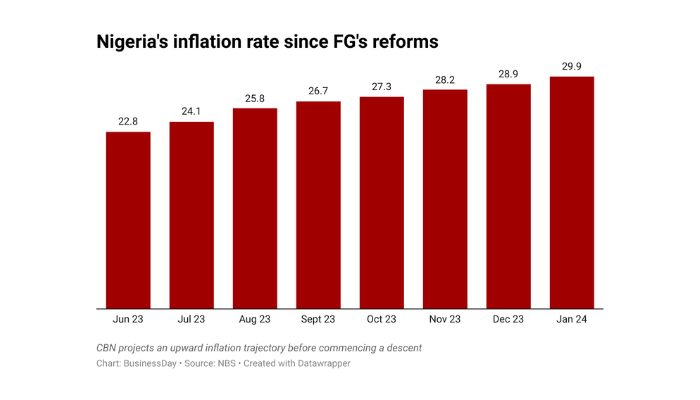Introduction: Since assuming office in May 2023, President Bola Ahmed Tinubu has embarked on a series of bold economic reforms aimed at stabilizing Nigeria’s economy. These measures, including the removal of fuel subsidies and unification of exchange rates, have been lauded by international institutions like the International Monetary Fund (IMF) for their potential to enhance fiscal discipline and promote long-term growth. However, nearly two years into these reforms, the average Nigerian continues to grapple with escalating inflation, food insecurity, and deepening poverty, raising questions about the immediate human cost of these policies.
President Tinubu’s administration has implemented significant policy shifts, and austerity reforms that they perceive as ambitious steps towards economic stability. Notably, these policies include:
• Fuel Subsidy Removal: Aimed at reducing government expenditure and reallocating funds to critical sectors.
• Exchange Rate Unification: Designed to eliminate arbitrage opportunities and attract foreign investment.
• Monetary Policy Tightening: Intended to curb inflation and stabilize the naira.
The IMF, in its 2025 Article IV Consultation, acknowledged these efforts, stating that Nigeria has taken “important steps to stabilize the economy, enhance resilience, and support growth.”
But these economic indicators constitute a mixed bag. While some macroeconomic indicators show signs of improvement, others paint a concerning picture:
• Inflation: As of March 2025, Nigeria’s annual inflation rate rose to 24.23%, up from 23.18% in February, driven primarily by surging food prices.
• Foreign Capital Inflows: The Central Bank of Nigeria (CBN) reported an increase in foreign capital inflows to $2.06 billion in January 2025, compared to $1.57 billion in December 2024, indicating renewed investor interest.
• Trade Surplus: Nigeria’s trade surplus improved to $2.20 billion in January 2025, up from $1.06 billion in December 2024, reflecting a boost in export activities.
Despite these positive trends, the reforms have yet to translate into tangible benefits for the majority of Nigerians. The IMF has expressed concern that “poverty and food insecurity remain high,” highlighting that the gains from reforms have not been evenly distributed. The human costs of these reforms have been rising poverty and food insecurity. A report by the World Food Program projects that 33 million Nigerians will face acute food insecurity in 2025, exacerbated by economic hardship, climate change, and ongoing conflicts in the northeast.
Quite predictably, the public sentiment has been marked by growing discontent. The austerity measures have sparked widespread discontent among Nigerians, who are struggling with the rising cost of living. The removal of fuel subsidies led to a tripling of petrol prices, while the devaluation of the naira has increased the cost of imported goods. These factors have contributed to what some describe as the worst cost-of-living crisis in a generation.
President Tinubu has defended the reforms as necessary for securing Nigeria’s economic future, urging citizens to endure short-term hardships for long-term gains, and admonishing Nigerians to be patient. The administration continues to emphasize that funds saved from subsidy removals are being redirected towards infrastructure and social programs, although transparency regarding these allocations remains a concern.
Conclusion: Nigeria stands at a critical juncture, balancing the pursuit of economic stability with the immediate needs of its populace. While the reforms have garnered international praise, their success ultimately hinges on the government’s ability to mitigate their adverse effects on vulnerable populations and ensure that the path to prosperity is inclusive and equitable.





